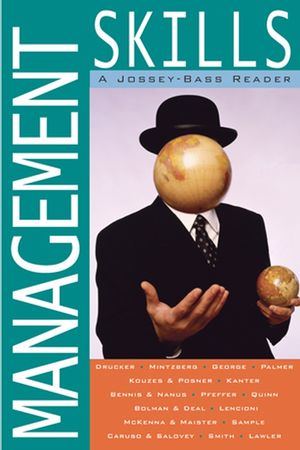|
Textbook
Management Skills: A Jossey-Bass ReaderISBN: 978-0-7879-7341-4
Paperback
832 pages
November 2004, ©2005, Jossey-Bass
 This is a Print-on-Demand title. It will be printed specifically to fill your order. Please allow an additional 10-15 days delivery time. The book is not returnable.
|
||||||
Acknowledgments.
Part One: What Makes a Great Manager?
Chapter 1: Leadership Is Authenticity, Not Style (Bill George).
Chapter 2: Credibility Is the Foundation of Leadership (James M. Kouzes, Barry Z. Posner).
Chapter 3: Management vs. Leadership (Warren Bennis, Burt Nanus).
Chapter 4: Rounding Out the Manager’s Job (Henry Mintzberg).
Chapter 5: The New Managerial Work (Rosabeth Moss Kanter).
Chapter 6: The Postcapitalist Executive: An Interview with Peter F. Drucker (T George Harris).
Part Two: Creating and Shaping the Work Environment.
Chapter 7: Seven Practices of Successful Organizations (Jeffrey Pfeffer).
Chapter 8: Hire the Right People (Edward E. Lawler III).
Chapter 9: Managing the Interview Process (Richaurd Camp, Mary E. Vielhaber, Jack L. Simonetti).
Chapter 10: Employment Law from a Manager’s Perspective (Dana M. Muir).
Chapter 11: Pick Relevant Metrics (Douglas K. Smith).
Chapter 12: How Change Really Comes About (Rosabeth Moss Kanter, Barry A. Stein, Todd D. Jick).
Chapter 13: Learning to Lead Change: The New Principles for CEOs and Companies (David A. Nadler, with Mark B. Nadler).
Part Three: Communicating, Leading, and Motivating People.
Chapter 14: The Manager as Politician (Lee G. Bolman, Terrence E. Deal).
Chapter 15: Artful Listening (Steven B. Sample).
Chapter 16: Establish Competence and Build Trust (Terry Pearce).
Chapter 17: Read People: Identifying Emotions (David R. Caruso, Peter Salovey).
Chapter 18: The Seven Essentials of Encouraging (James M. Kouzes, Barry Z. Posner).
Chapter 19: Motivating and Satisfying Excellent Individuals (Edward E. Lawler III).
Chapter 20: How to Give Feedback (Harvey Robbins, Michael Finley).
Chapter 21: Developmental Relationships (Cynthia D. McCauley, Christina A. Douglas).
Part Four: Getting the Work Done.
Chapter 22: The Call for Results (Clinton O. Longenecker, Jack L. Simonetti).
Chapter 23: Operating Within the Realities of Organizational Life (J. Davidson Frame).
Chapter 24: Solving the Problem of Bad Meetings (Patrick Lencioni).
Chapter 25: Politically Astute Negotiating (Kathleen Kelley Reardon).
Chapter 26: Deal with Your Crises (Patrick J. McKenna, David H. Maister).
Part Five: Leading Complex Organizational Processes.
Chapter 27: Dealing with Conflict (Marick F. Masters, Robert R. Albright).
Chapter 28: Overcoming the Five Dysfunctions of a Team (Patrick Lencioni).
Chapter 29: Myths and Realities of Leading Virtual Teams (Deborah L. Duarte, Nancy Tennant Snyder).
Chapter 30: Building Companies Where Innovation Is a Way of Life (Robert I. Sutton).
Part Six: Sustaining the Great Manager.
Chapter 31: Leading from Within (Parker J. Palmer).
Chapter 32: Reflective Action (Robert E. Quinn).
Chapter 33: From Success to Significance (David Batstone).
Chapter 34: If Not Me, Then Who? If Not Now, When? (Bill George).
Notes and References.
Name Index.
Subject Index.
On-line instructor’s guide available at www.wiley.com/college/jbreaders.



